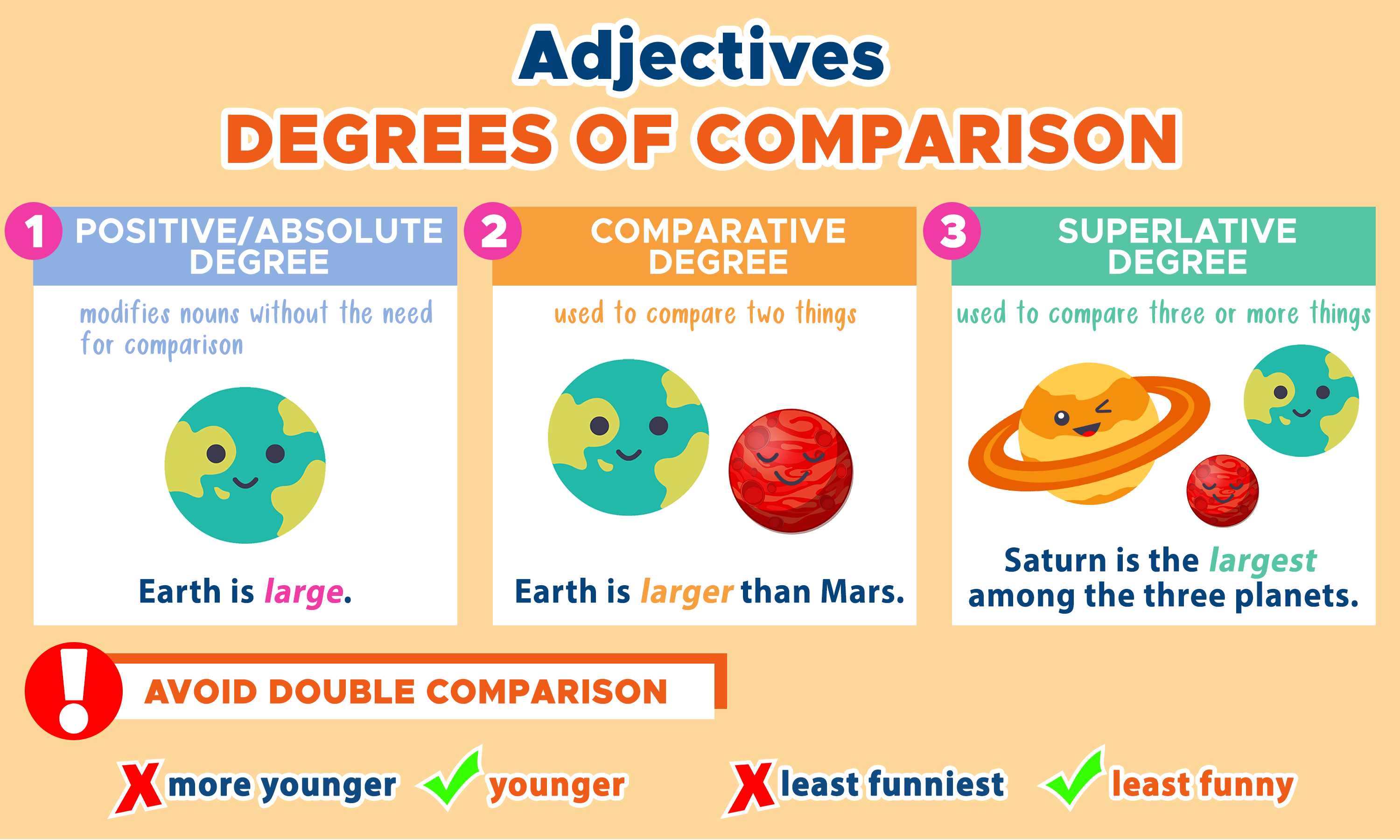More than just modifying nouns and pronouns, adjectives also express degrees of comparison. “Project A is easier than Project B, but Project C is the easiest among the three.” Adjectives show the degree to which a noun has the quality being discussed and compared to another noun.
- Rica has a louder voice than Allan.
- Hayley has the loudest voice among the three of them.
- He is more adventurous than his sister.
- He is the kindest person I know. [implied comparison to all the persons the speaker knows]
- The house seems emptier now than when mom was here.
Related Reading: Adjectives – Modifying Nouns & Pronouns
Forming the Three Degrees of Comparison:
Adjectives come in three degrees: positive, comparative, and superlative. Positive adjectives (also called absolute adjectives) are the “base” form of adjectives. Positive adjectives modify words on their own without the need for comparison. Examples are: tall, big, high, bad, lovely, kind, weak, etc.
Comparative adjectives are used to compare two things. To form the comparative degree of one- or two-syllable adjectives ending in -ly, add the suffix –er (or just -r for adjectives ending in letter e). For longer words, add more or less in front. Examples are: bigger, lovelier, simpler, more exciting, more beautiful, less expensive, less cheerful.
Lastly, superlative adjectives compare three or more things. To form the superlative, add the suffix -est to the word, or precede it with most or least. Here are some examples: tallest, loveliest, brightest, most behaved, most liked, most shocking, least improved, least creative.
Here’s a table of sample adjectives in the three degrees:
| POSITIVE | COMPARATIVE | SUPERLATIVE |
| wise | wiser | wisest |
| loud | louder | loudest |
| filthy | filthier | filthiest |
| happy | happier | happiest |
| stubborn | more stubborn | most stubborn |
| important | less important | least important |

Use of Comparative & Superlative Degrees of Comparison:
Positive adjectives are the easiest to use among the three degrees because they describe nouns without comparing. But comparative and superlative degrees need more discernment. Use the comparative degree when comparing two things; use the superlative when comparing three or more.
Comparative degree:
- Sheena is more punctual than Jean.
- Joshua looks younger than Paul.
- Joyce seems better now. [implied comparison between then and now]
Superlative degree:
- Of the five students, Jan is the brightest.
- Ms. Locsin was the best teacher I had in college. [comparing all the teachers the speaker had in college]
- Among all my friends, she was the most reliable.
NOTE: Don’t use the comparative degree when comparing three or more things. Remember that the comparative is used to compare only two. For anything more than two, use the superlative.
WRONG: This bag is the cheapest of the two options.
CORRECT: This bag is the cheaper of the two options.
WRONG: Marie is most hardworking than Ada
CORRECT: Marie is more hardworking than Ada.
WRONG: “Hachi: A Dog’s Tale” is one of the sadder movies I’ve seen
CORRECT: “Hachi: A Dog’s Tale” is one of the saddest movies I’ve seen
ALSO CORRECT: “Hachi: A Dog’s Tale” is the saddest movie I’ve seen.
Avoid Double Comparisons:
A double comparison occurs when we add suffixes -er or -est added to the adjective and, at the same time, precede it with most or more. Remember to use only one of these two ways; never use both at the same time.
WRONG: The book is more creepier than its movie adaptation.
CORRECT: The book is creepier than its movie adaptation.
WRONG: She got the most highest grade this semester.
CORRECT: She got the highest grade this semester.
Exercise.
Fill in the blanks with the correct degree of comparison in the parentheses. Bolden the modified nouns.
- My workload is getting _____ (more lighter, lighter, lightest) each month.
- Jay wrote the _____ (more heartfelt, most heartfelt) reflection paper among the group.
- She was _____ (least deserving, more deserving, deserving) of the award than Dana.
- Why do I have to carry the _____ (more heavier, heavier) bag?
- I am the _____ (happier, most happiest, happiest) when I’m with you.
Answers.
- My workload is getting lighter each month.
- Jay wrote the most heartfelt reflection paper among the group.
- She was more deserving of the award than Dana.
- Why do I have to carry the heavier bag?
- I am the happiest when I’m with you.
Thank you for reading. We hope it’s effective! Always feel free to revisit this page if you ever have any questions about the degrees of comparison.

